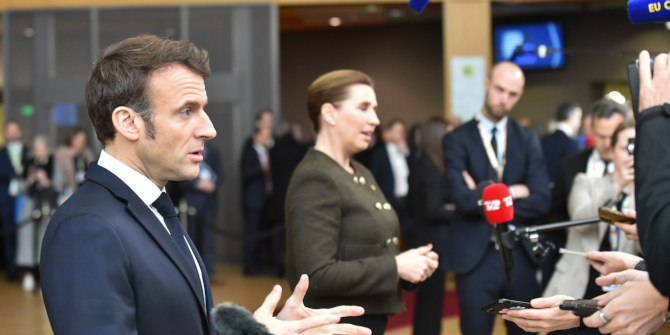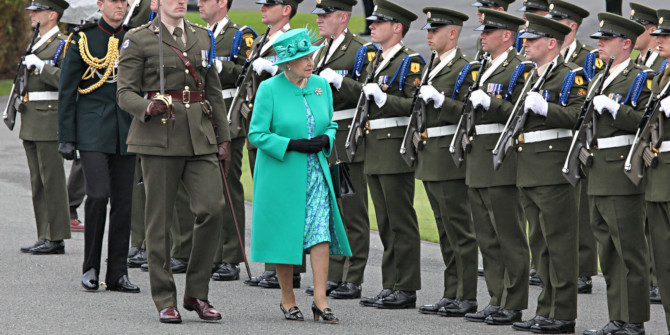 Danish voters opted to reject a proposal to eliminate Denmark’s current opt-outs in EU Justice and Home Affairs cooperation in a referendum on 3 December. Henrik Larsen writes on what the vote means for Denmark and the rest of the EU. He argues that while the referendum may not precipitate a major change in Danish EU policy, it will provide a boost for Eurosceptic parties who support a UK-style renegotiation of the country’s terms of membership.
Danish voters opted to reject a proposal to eliminate Denmark’s current opt-outs in EU Justice and Home Affairs cooperation in a referendum on 3 December. Henrik Larsen writes on what the vote means for Denmark and the rest of the EU. He argues that while the referendum may not precipitate a major change in Danish EU policy, it will provide a boost for Eurosceptic parties who support a UK-style renegotiation of the country’s terms of membership.
In a referendum on 3 December 2015, the Danish electorate voted ‘no’ to taking part in EU Justice and Home Affairs (JHA) cooperation, under the same terms as the UK had done since the adoption of the Maastricht Treaty. The result raises important questions about Danish policy towards Europe, as well as broader European questions.
The background for the referendum was as follows. When the Danes rejected the Maastricht Treaty in June 1992, the solution found for the Danes (and for the ratification procedure) was the introduction of four Danish opt-outs. The four Danish opt-outs were agreed in the Edinburgh Agreement in December 1992 and confirmed in a Danish referendum in 1993 which allowed the ratification procedure to proceed. The four opt-outs were: no participation in the euro; no participation in majority voting in Justice and Home Affairs; no participation in EU defence; and no participation in European citizenship.

Subsequently, however, significant numbers of the political elite and a majority of the parties in the Danish Parliament, the Folketing, considered the four opt-outs to be detrimental to Danish interests in the EU, which they saw as being to situate Denmark as close as possible to the EU core. Danish European policy since 1993 has been conducted by governments who have taken this view and have wanted to abolish the Danish exemptions. A referendum on adoption of the euro in 2000 ended with a ‘no’ with figures – 53 per cent no and 47 per cent yes – that were almost identical to the result of the 3 December 2015 referendum.
The precise reasons for the 3 December referendum being held related to developments within EU Justice and Home Affairs. Since the Amsterdam Treaty, more and more areas within JHA have moved from being decided by unanimity to being decided by qualified majority voting. This meant that increasingly Copenhagen has not been able to take part in these decisions due to the Edinburgh opt-out.
When Denmark has wanted to be part of the rules agreed on, it has had to conclude parallel agreements with the EU on each individual issue. This is a lengthy and complicated procedure, and the EU has not always agreed to concluding parallel agreements with Denmark. The majority of the political parties were not happy with this situation. At the same time, a referendum on the EU was always seen as a risky business for any government – not least because of the unsettled nature of the European political scene throughout the last 10-15 years.
Denmark has taken part in European police cooperation – Europol – from the very beginning. But the rules about Europol were about to change. And the change would be made by qualified majority voting which implied that Copenhagen would not automatically be a participant in Europol under the terms of the new Europol agreement. This, together with the problems Denmark was increasingly facing in taking part in other elements of JHA cooperation, such as anti-terrorism operations, formed the background for the calling of the referendum.
The object of the vote was whether Denmark should accede to JHA under the same terms as the UK: that is, with the possibility of opting into policy decisions that were desirable without being forced to take part. The political parties supporting a Yes (all parties apart from the populist Danish People’s Party, the left-wing Unity List and the ultra-liberal New Alliance) had agreed that, in the case of a ‘yes’, Denmark would opt into 22 existing regulations on legal cooperation including Europol which were seen as clearly serving Danish interests.
But it would not take part in decisions on asylum and refugee policy without a new referendum on this specific issue. These terms were laid out so as to make the ‘yes’ option as attractive as possible in a situation where the Danish People’s Party is the second biggest party in the Folketing and persistently criticises Danish refugee policy for not being firm enough.
After a long period of time where the polls were suggesting a ‘yes’, the ‘no’ side gained strength over the final couple of months. Some of the most important reasons for this are that, firstly, the Danish opt-outs are seen by many Danes as a symbolic way of marking limits on EU influence in Denmark. The substance of the issue is not always as important as the symbolic value of keeping the opt-outs as they are. Many were unconvinced that Denmark would be significantly better off by participating under the same terms as the British.
Moreover, a poll during the last month before the referendum showed that a significant majority thought that Denmark would be joining the EU’s asylum policy in future, despite the ‘yes’ side having promised a referendum before this could happen. There was, in other words, a significant level of distrust towards the ‘yes’ politicians – not unlike the general European tendency. There were also different kinds of ‘no voter’. Some on the left felt that the ‘yes’ politicians’ reassurance that Denmark would not take part in cooperation on asylum seekers was not idealistic enough and voted ‘no’. Last but not least, the presence of strong Eurosceptic parties in the Folketing – stronger than ever before – meant that the political elite did not present a unitary view.
After the referendum the ‘no’ parties have demanded a change in Danish European policy from the ruling consensus which has tried to keep Denmark as close as possible to the EU core in spite of the four Danish opt-outs. The Danish People’s Party has demanded that Denmark follow the UK in its attempts to redefine its relationship with the EU through the renegotiation of its terms of membership. The Danish government is already one of the strongest supporters of the UK on the renegotiation of the British terms.
The most likely outcome is that Danish European policy will remain relatively unaltered, as the parties that see a close Danish engagement with the EU as crucial for Denmark still hold a significant majority. However, after two referendums in which the Danes have said ‘no’ to abolishing parts of the out-outs, the opt-outs have acquired an even more permanent character for Denmark. There may be some political adaption to this condition. A new referendum on abolishing any of the Danish exemptions is not likely for a very long time.
Please read our comments policy before commenting.
Note: This article gives the views of the author, and not the position of EUROPP – European Politics and Policy, nor of the London School of Economics. Featured image credit: News Oresund / Flickr (CC BY 2.0)
Shortened URL for this post: http://bit.ly/1RGpPAB
_________________________________
 Henrik Larsen – University of Copenhagen
Henrik Larsen – University of Copenhagen
Professor Henrik Larsen holds the Jean Monnet Chair in European foreign and security integration at the Department of Political Science, University of Copenhagen.





